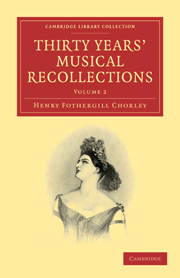Book contents
- Frontmatter
- Contents
- THE YEAR 1847
- THE YEAR 1848 (Her Majesty's Theatre.)
- THE YEAR 1848 (Royal Italian Opera.)
- THE YEAR 1849 (Her Majesty's Theatre.)
- THE YEAR 1849 (Royal Italian Opera.)
- THE YEAR 1850 (Her Majesty's Theatre.)
- THE YEAR 1850 (Royal Italian Opera.)
- THE YEAR 1851 (Her Majesty's Theatre.)
- THE YEAR 1851 (Royal Italian Opera.)
- THE YEAR 1852 (Her Majesty's Theatre.)
- THE YEAR 1852 (Royal Italian Opera.)
- THE YEAR 1853 (Royal Italian Opera.)
- THE YEAR 1854 (Royal Italian Opera)
- THE YEAR 1855 (Royal Italian Opera.)
- THE YEAR 1856 (Her Majesty's Theatre.)
- THE YEAR 1856 (Royal Italian Opera.)
- THE YEAR 1857 (Royal Italian Opera.)
- THE YEAR 1857 (Her Majesty's Theatre.)
- THE YEAR 1858 (Her Majesty's Theatre.—Royal Italian Opera.—Drury Lane.)
- THE YEAR 1859 (Royal Italian Opera.—Drury Lane.)
- The Last Chapter
THE YEAR 1852 (Royal Italian Opera.)
Published online by Cambridge University Press: 29 August 2010
- Frontmatter
- Contents
- THE YEAR 1847
- THE YEAR 1848 (Her Majesty's Theatre.)
- THE YEAR 1848 (Royal Italian Opera.)
- THE YEAR 1849 (Her Majesty's Theatre.)
- THE YEAR 1849 (Royal Italian Opera.)
- THE YEAR 1850 (Her Majesty's Theatre.)
- THE YEAR 1850 (Royal Italian Opera.)
- THE YEAR 1851 (Her Majesty's Theatre.)
- THE YEAR 1851 (Royal Italian Opera.)
- THE YEAR 1852 (Her Majesty's Theatre.)
- THE YEAR 1852 (Royal Italian Opera.)
- THE YEAR 1853 (Royal Italian Opera.)
- THE YEAR 1854 (Royal Italian Opera)
- THE YEAR 1855 (Royal Italian Opera.)
- THE YEAR 1856 (Her Majesty's Theatre.)
- THE YEAR 1856 (Royal Italian Opera.)
- THE YEAR 1857 (Royal Italian Opera.)
- THE YEAR 1857 (Her Majesty's Theatre.)
- THE YEAR 1858 (Her Majesty's Theatre.—Royal Italian Opera.—Drury Lane.)
- THE YEAR 1859 (Royal Italian Opera.—Drury Lane.)
- The Last Chapter
Summary
Three new operas were produced, each as distinct one from the other as well could be,—“I Martin,” by Donizetti, was arranged for the Grand Opera at Paris, from the “Poliuto” written for Naples, — which is said to have cost poor Nourrit his life. — On quitting France, unable to face the inevitable succession to his throne of M. Duprez, that poetical but too sensitive artist conceived the desperate idea of transforming himself into an Italian singer. He would not see that his day was done!—The disfavour with which his attempt was received at the Teatro San Carlo, where he appeared in this “Poliuto,” exasperated his distress of mind, already verging on insanity, and brought about the act of self-destruction—one of the saddest stories of compulsory retreat in the annals of the stage.
“I Martiri,”—though supported in Paris by Duprez, whose singing of the “Credo” was prodigiously admired by our neighbours,—in no respect bore out the favour which had attended “La Favorita.”—The opera is diffuse, the story is dull—containing a mixture of false Paganism and stage-Christianity, which the English have not yet learned to endure in Opera.—Then, the music is generally weak in effect, till the final duett of enthusiasm, which, of its kind,—including the inevitable modern use of unison,—offers good room for display to strong singers: though less exciting, perhaps, than the final duett in “La Favorita.”—Here it was taken by Signor Tamberlik and Madame Julienne—the latter a French or Belgian lady, who had already sang in London, and who now aspired to serious Italian Opera.
- Type
- Chapter
- Information
- Thirty Years' Musical Recollections , pp. 180 - 192Publisher: Cambridge University PressPrint publication year: 2009First published in: 1862

